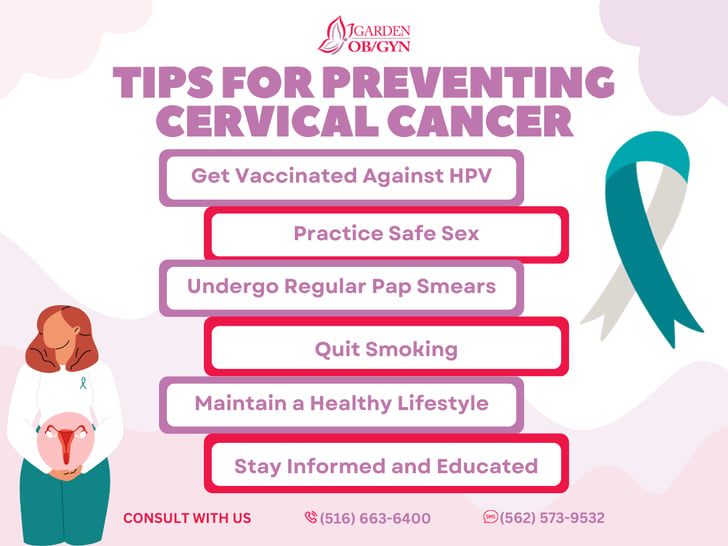Tips for Preventing Cervical Cancer
Cervical cancer is largely preventable. Adopt healthy habits: vaccination, safe sex, screenings, quit smoking, embrace a healthy lifestyle, and stay informed to significantly reduce the risk for women worldwide.

Cervical cancer is a significant health concern that affects women around the world. However, the good news is that cervical cancer is largely preventable through proactive measures. By adopting healthy habits and taking advantage of available medical interventions, women can significantly reduce their risk of developing cervical cancer. Here are six essential tips for preventing cervical cancer:
-
Get Vaccinated Against HPV: Human Papillomavirus (HPV) is a major risk factor for cervical cancer. The HPV vaccine is a highly effective way to prevent infection with the most common types of the virus. The vaccine is typically administered to adolescents and young adults, but it can also be beneficial for older individuals who have not yet been vaccinated. Consult with your healthcare provider to determine the most appropriate vaccination schedule for your age and health status.
-
Practice Safe Sex: Engaging in safe sexual practices is crucial for preventing HPV and, consequently, cervical cancer. Using barrier methods, such as condoms, during sexual activity can reduce the risk of HPV transmission. It's also important to limit the number of sexual partners and choose partners who have been vaccinated against HPV.
-
Undergo Regular Pap Smears: Regular Pap smears, also known as Pap tests or Pap smears, are essential for early detection of abnormal cervical cells that could develop into cancer. These screenings can detect changes in the cervix before cancer develops, allowing for early intervention and treatment. Women should follow their healthcare provider's recommendations for the frequency of Pap smears based on their age and health history.
-
Quit Smoking: Smoking has been linked to an increased risk of cervical cancer. Tobacco smoke contains harmful chemicals that can damage cervical cells and contribute to the development of cancer. Quitting smoking not only reduces the risk of cervical cancer but also provides numerous other health benefits. If you need assistance in quitting smoking, seek support from healthcare professionals or support groups.
-
Maintain a Healthy Lifestyle: Adopting a healthy lifestyle can contribute to overall well-being and reduce the risk of cervical cancer. A balanced diet rich in fruits, vegetables, and whole grains provides essential nutrients that support the immune system and help fight off infections, including HPV. Regular exercise is also beneficial for maintaining a healthy weight, which is associated with a lower risk of cervical cancer.
-
Stay Informed and Educated: Knowledge is a powerful tool in the prevention of cervical cancer. Stay informed about the latest developments in cervical cancer prevention and screening guidelines. Educate yourself and others about the importance of vaccination, safe sexual practices, and regular screenings. Being proactive in understanding your own health and advocating for preventive measures can significantly contribute to reducing the incidence of cervical cancer.
Preventing cervical cancer is within reach for many women by adopting a combination of lifestyle choices, vaccinations, and regular screenings. By following these six essential tips, women can empower themselves to take control of their health and reduce their risk of developing cervical cancer. Consult with healthcare professionals for personalized advice and guidance tailored to your individual health needs.
































